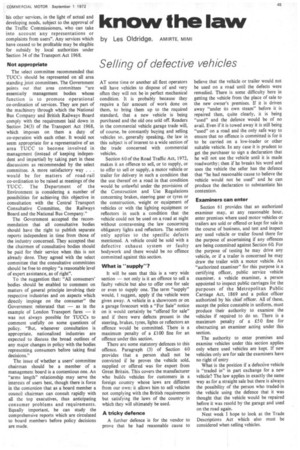know the law
Page 51

If you've noticed an error in this article please click here to report it so we can fix it.
by Les Oldridge, AMIRTE. MIMI
Selling of defective vehicles
AT some time or another all fleet operators will have vehicles to dispose of and very often they will not be in perfect mechanical condition. It is probably because they require a fair amount of work done on them, to bring them up to the required standard, that a new vehicle is being purchased and the old one sold off. Readers in the commercial vehicle garage trade will, of course, be constantly buying and selling vehicles so, generally speaking, the law in this subject is of interest to a wide section of the trade concerned with commercial vehicles.
Section 60 of the Road Traffic Act, 1972, makes it an offence to sell, or to supply, or to offer to sell or supply, a motor vehicle or trailer for delivery in such a condition that the use thereof on a road in that condition would be unlawful under the provisions of the Construction and Use Regulations concerning brakes, steering gear or tyres or the construction, weight or equipment of vehicles or with the lighting equipinent or reflectors in such a condition that the vehicle could not be used on a road at night without contravening the law concerning obligatory lights and reflectors. The section only applies to the specific defects mentioned. A vehicle could be sold with a defective exhaust system or faulty bodywork and there would be no offence committed against this section.
What is "supply"?
It will be seen that this is a very wide section — not only is it an offence to sell a faulty vehicle but also to offer one for sale or even to supply one. The term "supply" would, I suggest, apply if the vehicle were given away. A vehicle in a showroom or on a garage forecourt with a "For Sale" notice on it would certainly be "offered 'for sale" and if there were defects present in the steering, brakes, tyres, lights or reflectors an offence would be committed. There is a maximum penalty of a £100 fine for an offence under this section.
There are some statutory defences to this offence. Paragraph (3) of Section 60 provides that a person shall not be convicted if he proves the vehicle sold, supplied or offered was for export from Great Britain. This covers the manufacturer who builds vehicles for customers in a foreign country whose laws are different from our own: it allows him to sell vehicles not complying with the British requirements but satisfying the laws of the country in which they will ultimately be used.
A tricky defence A further defence is for the vendor to prove that he had reasonable cause to believe that the vehicle or trailer would not be used on a road until the defects were remedied. There is some difficulty here in getting the vehicle from the place of sale to the new owner's premises. If it is driven away "under its own steam" before it is repaired then, quite clearly, it is being "used" and the defence would be of no avail. Even if it is towed away it is still being "used" on a road and the only safe way to ensure that no offence is committed is for it to be carried on a low-loader or other suitable vehicle. In any case it is prudent to get the purchaser to sign a declaration that he will not use the vehicle until it is made 'roadworthy; then if he breaks his word and uses the vehicle the seller has the defence that "he had reasonable cause to believe the vehicle would not be used" and he can • produce the declaration to substantiate his contention.
Examiners can enter
Section 61 provides that an authorized examiner may, at any reasonable hour, enter premises where used motor vehicles or trailers are sold or offered or kept for sale in the course of business, and test and inspect any used vehicle or trailer found there for the purpose of ascertaining if any offences are being committed against Section 60. For the purpose of testing he may drive any vehicle, or if a trailer is concerned he may draw the trailer with a motor vehicle. An "authorized examiner" for this purpose is a certifying officer, public service vehicle examiner, a vehicle examiner, a person appointed to inspect public carriages for the purposes of the Metropolitan Public Carriage Act, 1869 and a police officer authorized by his chief officer. All of these, except the police constable in uniform, must produce their authority to examine the vehicles if required to do so. There is a maximum penalty of a £50 fine for obstructing an examiner acting under this section.
The authority to enter premises and examine vehicles under this section applies only where used vehicles are kept. If new vehicles only are for sale the examiners have no right of entry What is the position if a defective vehicle is "traded in" in part exchange for a new vehicle? The law applies in exactly the same way as for a straight sale but there is always the possibility of the person who traded-in the vehicle using the defence that it was thought that the vehicle would be repaired before it was resold by the garage and used on the road again.
Next week I hope to look at the Trade Descriptions Act which also must be considered when selling vehicles.


































































































